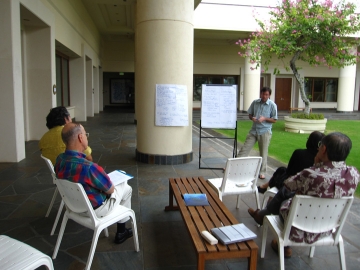Island Industrial Ecology
The workshop for Island Industrial Ecology and Sustainability was held during the project year on Hawai’i Island and the primary attendee group successfully convened 17 researchers, including seven from Japan, five from the United States, three from Europe, one from Singapore, and one from Australia.

The project aimed to bring together the leading experts now conducting research on the industrial ecology of islands and its relationship to sustainability. Each expert participant has been examining a specific island or chain of islands individually, but was then called upon to seek cross cutting themes collectively to unify the knowledge gained. To meet this end, the project was designed and conducted with two major aspects: 1) the workshop on Island Industrial Ecology and Sustainability and 2) a special series on this topic in the Journal of Industrial Ecology. The workshop was comprised of two main parts. The first day and a half provided a forum to bring together the dispersed strands of investigation thus far so that each participant could present his or her research and lead discussion among the group. During the final day, participants discussed a series of methodological and research topics derived from the earlier days that were understood as important drivers for island sustainability that could be examined through industrial ecology.
Topics and questions for discussion and analysis included:
- What are the quantitative differences in resource requirements between supporting island life and supporting mainland life, in terms of material inputs and energy use?
- Waste disposal on islands is often expensive and severely constrained by geography, and yet on most islands, there is not a sufficient economy of scale to enable effective recycling and reuse businesses. What are alternate management and policy models to foster sustainable waste management and the development of resource circulation systems on islands?
- How do differing modes of tourism, including eco-tourism, affect island ecosystems, material and energy requirements, and related dependence on imports?
- How have island ecosystem services changed, how have the changes affected island livelihoods, and what are key driving forces for the changes?
- As urban areas on islands develop and become more dependent on imports, both their socio-economic and ecological systems become more vulnerable to hazards. For urban areas where material and energy requirements are already outstripping local island carrying capacity, what are successful strategies for increasing resilience and sustainability?
- How can the fragility of islands be communicated to residents in order to modify behaviors?
- How have changes in the social structures of islands affected the degree to which island life can be self-sustaining?
- How can findings based on islands be made most useful for study in non-island settings?